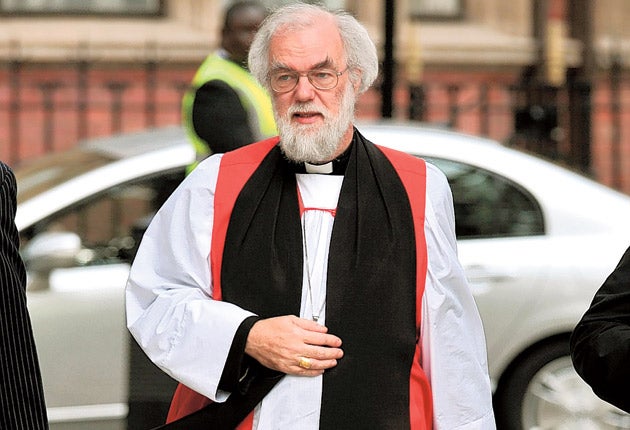Issue of women bishops threatens Church again

Your support helps us to tell the story
From reproductive rights to climate change to Big Tech, The Independent is on the ground when the story is developing. Whether it's investigating the financials of Elon Musk's pro-Trump PAC or producing our latest documentary, 'The A Word', which shines a light on the American women fighting for reproductive rights, we know how important it is to parse out the facts from the messaging.
At such a critical moment in US history, we need reporters on the ground. Your donation allows us to keep sending journalists to speak to both sides of the story.
The Independent is trusted by Americans across the entire political spectrum. And unlike many other quality news outlets, we choose not to lock Americans out of our reporting and analysis with paywalls. We believe quality journalism should be available to everyone, paid for by those who can afford it.
Your support makes all the difference.If anyone wanted a glimpse of the difficulty in keeping the Church of England together, they needed only to look at Dr Rowan Williams the last time the General Synod voted on women bishops: after hours of fractious debate inside York University's Central Hall in summer 2008, the Archbishop of Canterbury had his head in his hands.
Synod members had just passed a resolution affirming the church's commitment to consecrating women bishops. Dr Williams had begged the church's legislative assembly to consider some sort of compromise for the minority coalition of Anglo-Catholics, conservatives, evangelicals and scriptural traditionalists who oppose female leadership. But there was overwhelming support for women breaking the church's last glass ceiling.
Tomorrow the General Synod meets once more to discuss women bishops in what will be its most important debate since women were first allowed into the priesthood 16 years ago. The issue threatens to tear the Church of England apart, with both conservatives and liberals threatening to walk away if their demands are not met. Dr Williams has once again appealed for a compromise. Along with Dr John Sentamu, the Archbishop of York, he has tabled an amendment to ask any future woman bishop to abrogate some responsibilities to a man to cater for parishes opposed to women bishops.
But the Archbishops' hopes to find a middle way may have been dashed by the recent humiliation of Dr Jeffrey John, who is living in an openly gay but celibate civil partnership. Earlier this week, it was leaked that Dr John, the Dean of St Albans, was being considered for the post of Bishop of Southwark, a London diocese that is strongly supportive of gay clergy. But his name has been taken off the shortlist in a way similar to his removal from the running to be Bishop of Reading in 2003.
Reformists are outraged and accuse Dr Williams, a previously liberal theologian, of being in thrall to the Church's conservative minority. The Rev Colin Coward, the director of Changing Attitude, which campaigns for greater inclusion of lesbian, gay, bisexual and transgender clergy, says liberals will now go into this weekend's Synod in even less of a mood for compromise.
"We were already seething about the issue and now we're absolutely furious," he said. "Many of those in my circle just cannot understand why the Archbishop of Canterbury is so tolerant towards the conservatives when they exhibit such un-Christian tendencies."
He added: "I think the chances of the Archbishops' compromise amendment being adopted have been hugely damaged by the events of the past week. If it is thrown out, it will be a remarkable snub."
Much now rests on how Dr Williams holds his own over the coming four days. "The Jeffrey John debacle is certainly going to have an effect on Synod, but what kind of effect is difficult to tell," said one Synod member in favour of women bishops, who asked not to be named. "Everything is very much up in the air."
Join our commenting forum
Join thought-provoking conversations, follow other Independent readers and see their replies
Comments